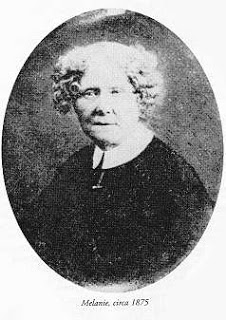– The un-burial of Melanie Hahnemann (M. Grimes)
 “In order to help with his family, honour him, and show that my devotion was not actuated by selfish motives, I asked him to give his whole fortune to his children, which matter was legally arranged, and became known throughout Germany. I voluntarily renounced the share which the law allots to the wife in the inheritance of the husband. I refused the wedding presents: everything even the smallest piece of furniture and linen was divided amongst the children.
“In order to help with his family, honour him, and show that my devotion was not actuated by selfish motives, I asked him to give his whole fortune to his children, which matter was legally arranged, and became known throughout Germany. I voluntarily renounced the share which the law allots to the wife in the inheritance of the husband. I refused the wedding presents: everything even the smallest piece of furniture and linen was divided amongst the children.
 Hahnemann was happy for the first time. I nursed him as one nurses a newborn child. I was his barber, his valet, his secretary. I loved and admired him so much that I would have served him on my bended knees. Never was tenderness more fully returned, never was a union stronger, this perfect and longed-for happiness, that each of us had found it its moral perfection was attained by our marriage. It lasted until his death and was never destroyed in spite of the extreme difference of age; thus it was again proved, that those who share the same views are of the same age.” (Haehl 2:323 )
Hahnemann was happy for the first time. I nursed him as one nurses a newborn child. I was his barber, his valet, his secretary. I loved and admired him so much that I would have served him on my bended knees. Never was tenderness more fully returned, never was a union stronger, this perfect and longed-for happiness, that each of us had found it its moral perfection was attained by our marriage. It lasted until his death and was never destroyed in spite of the extreme difference of age; thus it was again proved, that those who share the same views are of the same age.” (Haehl 2:323 )
That Hahnemann was happy cannot be contradicted. The letter written to Bönninghausen, May 22, 1835, is typical of this period.
To Bönninghausen he writes,
“Such a heavenly life as the one I lead with my wife whose perfection surpasses that of mortals, you can hardly imagine. She has just completed my portrait in oils and completed it in nine days …she had not touched a brush for three years, -now she can paint again without discomfort. That is the extent to which I have improved the health of my angelic wife!” (Haele 2:335)
Although some say he left Germany for Paris against his will, he was quite clear about his intent:
“It is quite impossible to say, when, if ever, I shall return” (Alleg. Hom. Ztg. 1864 v69 100).
 “In order to help with his family, honour him, and show that my devotion was not actuated by selfish motives, I asked him to give his whole fortune to his children, which matter was legally arranged, and became known throughout Germany. I voluntarily renounced the share which the law allots to the wife in the inheritance of the husband. I refused the wedding presents: everything even the smallest piece of furniture and linen was divided amongst the children.
“In order to help with his family, honour him, and show that my devotion was not actuated by selfish motives, I asked him to give his whole fortune to his children, which matter was legally arranged, and became known throughout Germany. I voluntarily renounced the share which the law allots to the wife in the inheritance of the husband. I refused the wedding presents: everything even the smallest piece of furniture and linen was divided amongst the children. Hahnemann was happy for the first time. I nursed him as one nurses a newborn child. I was his barber, his valet, his secretary. I loved and admired him so much that I would have served him on my bended knees. Never was tenderness more fully returned, never was a union stronger, this perfect and longed-for happiness, that each of us had found it its moral perfection was attained by our marriage. It lasted until his death and was never destroyed in spite of the extreme difference of age; thus it was again proved, that those who share the same views are of the same age.” (Haehl 2:323 )
Hahnemann was happy for the first time. I nursed him as one nurses a newborn child. I was his barber, his valet, his secretary. I loved and admired him so much that I would have served him on my bended knees. Never was tenderness more fully returned, never was a union stronger, this perfect and longed-for happiness, that each of us had found it its moral perfection was attained by our marriage. It lasted until his death and was never destroyed in spite of the extreme difference of age; thus it was again proved, that those who share the same views are of the same age.” (Haehl 2:323 )That Hahnemann was happy cannot be contradicted. The letter written to Bönninghausen, May 22, 1835, is typical of this period.
To Bönninghausen he writes,
“Such a heavenly life as the one I lead with my wife whose perfection surpasses that of mortals, you can hardly imagine. She has just completed my portrait in oils and completed it in nine days …she had not touched a brush for three years, -now she can paint again without discomfort. That is the extent to which I have improved the health of my angelic wife!” (Haele 2:335)
Although some say he left Germany for Paris against his will, he was quite clear about his intent:
“It is quite impossible to say, when, if ever, I shall return” (Alleg. Hom. Ztg. 1864 v69 100).